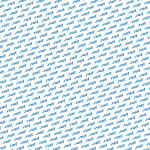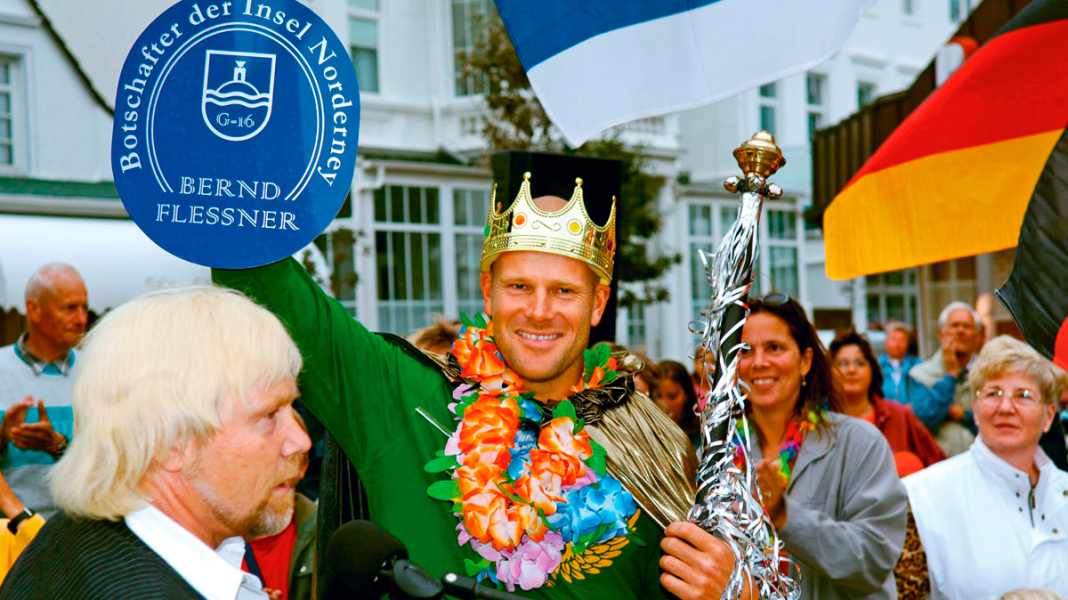
Spring 1989 - World Cup in Almanarre, France. Including the young German high-flyer Nathalie Siebel. The 19-year-old is already one of the top female wave riders in the world. With her new boyfriend in tow. A blond guy from Norderney called Bernd Flessner, who is cheerfully and carelessly racing through the regatta field, even though he is not taking part in the World Cup - an absolute no-go. This earns him the wrath of regatta organiser Wim Thijs in particular.
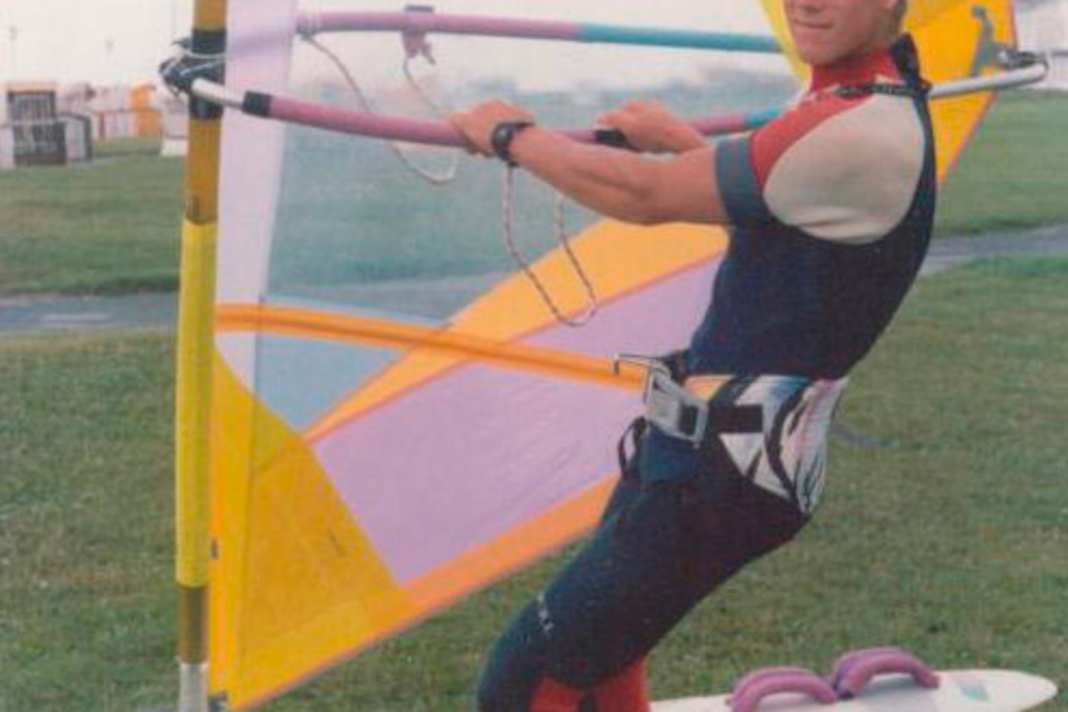





What was going on there, Mr Flessner?
It was waveriding in Almanarre for the first time in a long time and I was just jumping around in the contest area. Robert Teriithehau and Robby Naish flew around me and I didn't even realise that I was in the wrong place. Then they pushed me off with the helicopter and I came ashore somewhere offside. I just wondered why everyone was looking at me like that. Wim Thijs came up to me with a bright red head and shouted at me in a rage: 'I know your sailing number, you'll never be allowed to compete in the World Cup, I'll make sure of that! I was devastated and Ralf Bachschuster came up to me and said: 'If they have your sail number, they'll never let you start! And I just thought: Shit, your racing career hasn't even started yet and it's already over.
In autumn, you came 15th in the course race at the World Cup on Sylt - and then you were on the World Cup circuit for almost 15 years without interruption. The threat didn't really work, did it?
Walter Mielke was the regatta organiser at the Cup on Sylt and he always cheered me on. The next year, I had to take part in another qualifying race in France to make it into the main field. Wim Thijs was the regatta organiser again. But as I won the qualifying race, there was nothing he could do. After that, I raced the whole World Tour.
How were you able to afford that as a 19-year-old?
At that time, West Fashion had just joined Team Germany, which included Nathalie Siebel, Jutta Müller, Björn Schrader, Ralf Bachschuster and Robby Seeger. They then spotted me, financed my first year on the tour as a young rider and offered me the prospect of joining the team if I did well.
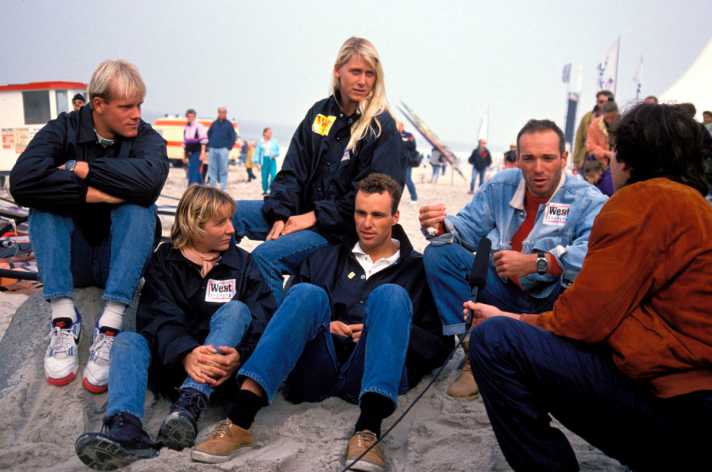
That sounds incredible for a young driver today.
That's right, you can't even imagine that today.
What were you able to earn with windsurfing back then?
As you know, you don't talk about money. But I can tell you that later I had a contract with a salary, travelling expenses, equipment and so on, and NeilPryde gave me 25 carbon masts and 25 carbon forks on top of all that. Imagine that today. Some of the one-piece carbon masts are now used as flagpoles by a sports club on Norderney.
Your career really took off at the beginning of the 90s. You became German champion for the first time in 1992. This was followed by 15 more national titles, you were IFCA Slalom World Champion twice, won four World Cups and were among the top ten in the world rankings for ten years. Now you are 44 years old and calling it a day, why?
I realised last year that I can no longer motivate myself as hard as I used to. When you've been preparing for regattas for over 25 years, training in all weathers, constantly on the go, having to organise yourself, then at some point you lose the motivation for this type of windsurfing. I now have two children and last year I also went through a difficult time personally and that's when you start to question yourself. I realised that I no longer enjoy my time on the water as much as I should. I often surf back and forth between the islands during training and had lost the feeling of what a great experience it actually is. And at some point you ask yourself whether it's still worth all the effort. Then there was the fact that I had a lot to do with illness this year, and the first grey, cold winter on Norderney after 25 winters in South Africa was also rather depressing.
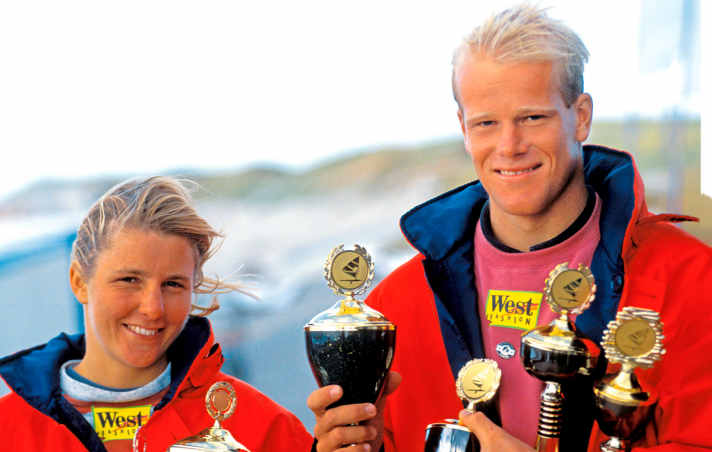
That sounds a little frustrated.
Not at all. Windsurfing has given me an incredible amount and I still love it and will continue to windsurf, but no more regattas. And now was actually the perfect time to stop. I had been a pro for 25 years and the Sylt World Cup was taking place for the 30th time. And the fact that I was once again in the final with all the top riders in my last slalom of my career - there was no better way to stop.
You played football quite well in your youth and are also a very good golfer. Wouldn't a career as a professional golfer or footballer have been better?
No way. I've experienced and learnt so much through windsurfing. It's not like the professional footballers who come to training in the morning with their fat trolley, get out with their kit bag, find their polished boots and washed jersey in the dressing room and don't have to worry about anything. As a professional windsurfer, I had to do everything on my own, organise trips, get equipment, find sponsors and then train to get the right results. I could never have learnt everything for life from a degree or another job.
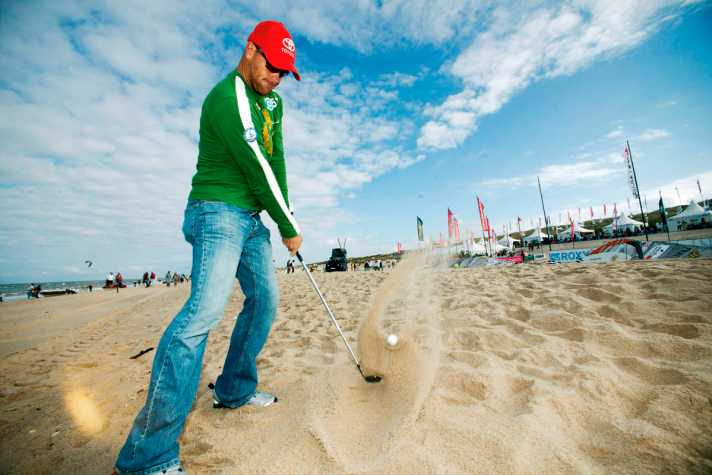
You experienced the golden years of windsurfing to the full, but in recent years you have also seen how the sport has become an absolute fringe sport with little money left for riders. But even in bad times, you have always managed to have very good sponsors and have marketed yourself excellently.
That's certainly true. That's certainly also because I work very well with my sponsors and can identify very well with the products. It's not the case with me that I stick some sticker on my sail and if someone else pays more next year, I just stick another sticker on. I've never done that. I've been associated with my sailing sponsor NeilPryde for 25 years. And if you were to ask me anything about a Mercedes Viano right now, I could tell you everything about the car down to the last detail, not because I have to, but because I stand behind the product. I also always come up with something new. For example, my surfboard tour from Norderney to Sylt. I've always wanted to do that and we planned it for a long time, filmed it and then distributed it very well to the media. I made it into the main evening news programme with the campaign - and of course my sponsors like that too.
Unfortunately, windsurfing is otherwise not really very present in the media, apart from the World Cup on Sylt.
That's the crazy thing. It works there and people see what a great sport windsurfing is and that there are some super guys. The many years of good press work are bearing fruit.
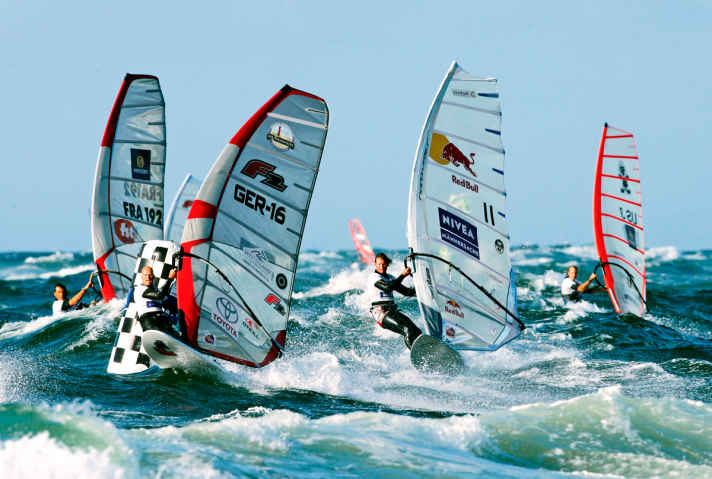
Sylt has been the only World Cup you've competed in for years. Otherwise, you've been focussing on the German Windsurf Cup for the last ten years. What's the situation there?
It's much more difficult there. There have been fewer and fewer participants in recent years. I personally believe that the topic needs to be completely reorganised. It also needs to be more attractive for surfers who have not previously taken part in regattas to take part. And that's not the case in its current form. The new long-distance format is certainly a good start, but it's not enough. It needs to be even easier and more attractive to get involved in regatta sport. Of course the organising agency Choppy Water has to earn money with the events, that is legitimate and has to be the case. But it's not enough to earn money with a few sausage stands and other stalls on the promenade while the sport and the athletes fall by the wayside. You would have to spend a bit of money, produce good film material and then give it to the press with a good distributor. You could provide television with great windsurfing sport all summer long. I can remember a particularly blatant example, the German Championships in 2007, when great conditions were announced in the middle of summer and it was clear that all disciplines would be contested. In addition, there were no Olympic Games, football World Cup or Bundesliga. It might have been possible to hire a film crew and guarantee a lot of TV coverage. It also makes little sense to race at a spot that is not very suitable for windsurfing just because the location sponsors the event. This year they even have a sponsor for the whole tour, so they could have considered paying out prize money for the riders or at least lowering the entry fee. The whole thing is not very attractive at the moment.
That would be a task for you and your newly founded agency to tackle this problem.
We have already organised the Round Norderney race twice, where the prize money was 3000 euros. But it really isn't easy, you have to say that. I don't know yet whether we'll get involved.
Many riders who, like you, have so much experience, get involved in development work with their board and sail sponsors. We've never really heard that much about you, is that something for the future?
You're right, I could perhaps have been more involved. I have so much experience today that once I've ridden a board in and out, I can tell you whether it's a good or bad board. Of course, I always gave my feedback to the manufacturers, but that was sometimes tough with the companies. They often arrived six months later and said, 'Bernd, we've heard from end users that this or that doesn't work' and I had to tell them, 'Guys, I told you that six months ago. I also sometimes can't understand the problems with materials today. In the 90s, I sometimes had my carbon masts in the rigged sail for ten days, took them out of the sail at the end of a regatta and they were straight as a die - today you leave your sail in the sun for half an hour and the mast is crooked. I ask myself, are we just starting the sport again? Sometimes I can't understand that.
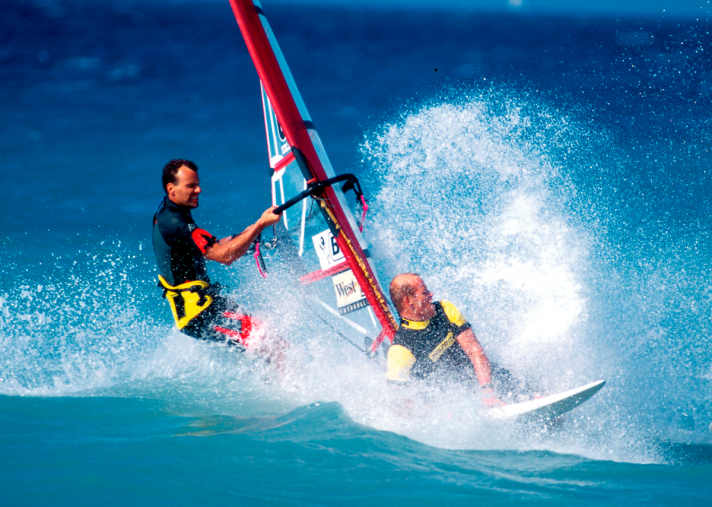
When you look back over the last two decades, what was the best time?
I am incredibly grateful that I was able to experience the 90s to the full. We had fantastic events, course races under the Golden Gate Bridge in San Francisco or the crazy regattas in Japan. I got to know great guys like Robert Teriitehau, I was close with Björn in the F2 team and we had an incredible amount of fun. I could tell anecdotes from that time for hours.
Maybe we'll have to do another book together after all. When did you slowly come to the decision to really stop?
That's also very funny, my old colleague Ralf Bachschuster always talks to me about it. In 1994, I gave an interview on NDR in which I was asked how long I could imagine sailing regattas. I said: I'll be finished by the time I'm 30 at the latest. Now I'm 44 and the real decision came in 2012, when my family situation changed radically and I found it increasingly difficult to motivate myself to train, even in bad weather. I was always alone on Norderney, I didn't have a training partner, then I was always at the regattas where you always have to be at the front, everyone wants to beat you, it just gets exhausting at some point.
Don't enjoy windsurfing any more?
On the contrary, I believe that when I no longer have the pressure of having to train and prepare for the regattas, I will enjoy windsurfing much more again and enjoy this incredibly beautiful sport. As I've said before, I used to travel back and forth between the North Frisian Islands to train and didn't realise what an incredible experience it was. This feeling of freedom when windsurfing is simply incomparable.
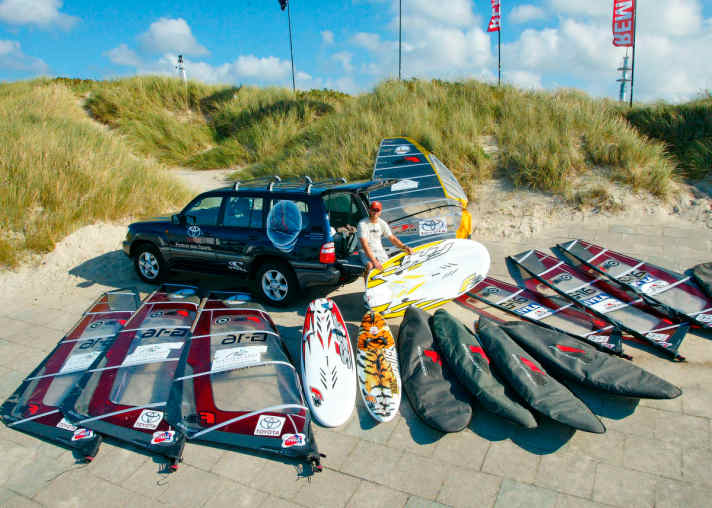
Would you want to live your life like that again today?
Windsurfing, definitely, but to be honest, I wouldn't want to do what we did back then again. I kept a record of how many days I was on the water, which sail I rode and which board I used for my entire windsurfing life. At my peak, I spent nine months travelling as a pro and a maximum of three months on Nordeney. I wouldn't want to do all that flying with all the loads of equipment today - my record was on Fuerte, where I once had twelve boards with me and a total of 450 kilos of luggage. If I had to do that again today, I'd go crazy. Four weeks on the Canary Islands tour, Fuerte, Gran Canaria, Tenerife - always putting everything up and taking it down, on the ferries with all the junk - you could chase me down. But back then, everyone did it.
What will your windsurfing career bring you in the future?
When you've been successful in the sport for so long, it's incredible who you get to know during this time and how well connected you become in the long term. I'm always amazed at how many people recognise me and how positive everyone is about windsurfing. Everyone has had some kind of contact with the sport and is fascinated by it. That is also the great opportunity for windsurfing. The images of windsurfing are fascinating for everyone and it would be important if people could be brought closer to it again via the media. Because what we do out there, whether it's windsurfing in the North Sea in force nine or the guys in Jaws or Philip Köster's jumps, is simply breathtaking for normal people. Our sport simply deserves a lot more attention.
